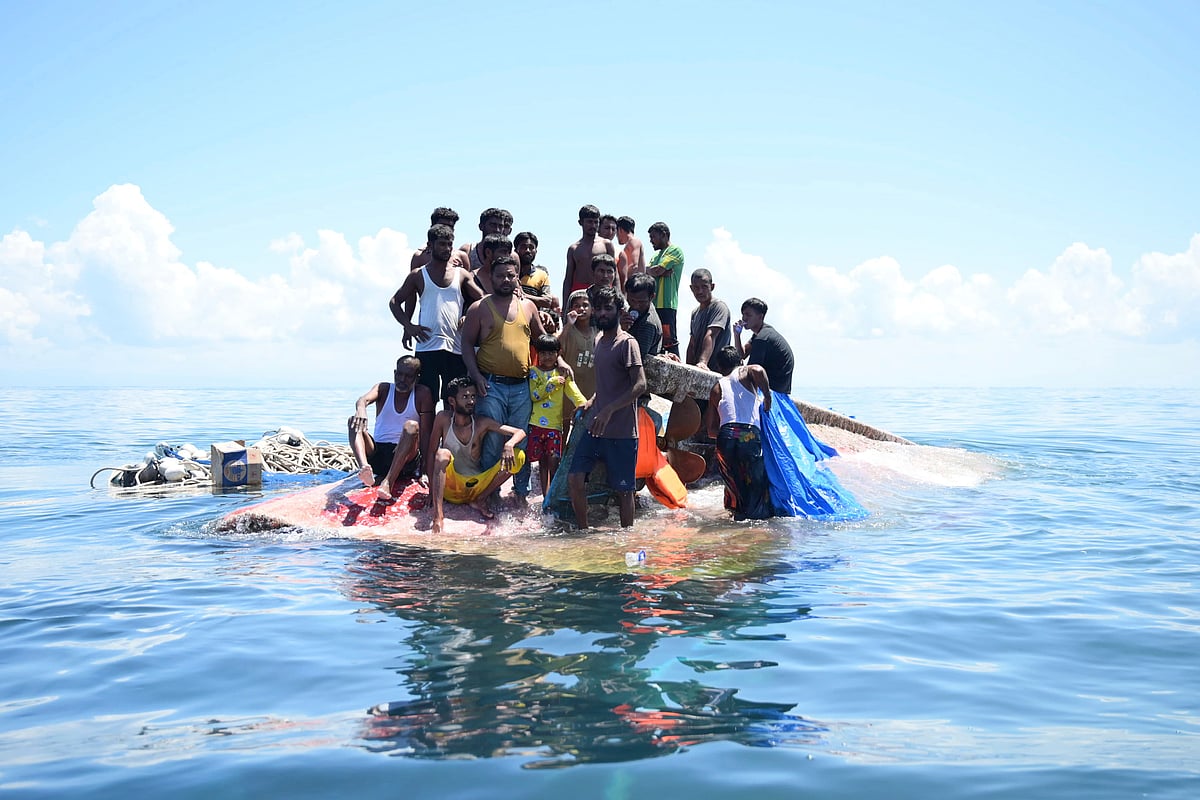After two unsuccessful campaigns, on Feb. 14, Indonesian Defense Minister Prabowo Subianto won the prize he has long coveted: the presidency. Prabowo likely prefers to see his victory as the result of his politics, but his success owes as much to the popularity of outgoing Indonesian President Joko Widodo, known as Jokowi. Prabowo ran against Jokowi in 2014 and 2019, losing both times. But Jokowi surprised many observers—and supporters—by appointing Prabowo as his defense minister in 2019, and he endorsed Prabowo’s bid for president this year. Jokowi’s eldest son, Gibran Rakabuming Raka, shared the ticket with Prabowo.
The final results of Indonesia’s election will be announced in a few weeks, but early counts suggest that Prabowo is in the lead with 58 percent of the vote, putting him significantly ahead of his rivals, Ganjar Pranowo and Anies Baswedan, both former provincial governors. The other candidates have alleged that irregularities took place on Feb. 14 and said they would challenge the vote; if there is evidence of widespread manipulation, the constitutional court could annul the result. The new president will not take office until October.
After two unsuccessful campaigns, on Feb. 14, Indonesian Defense Minister Prabowo Subianto won the prize he has long coveted: the presidency. Prabowo likely prefers to see his victory as the result of his politics, but his success owes as much to the popularity of outgoing Indonesian President Joko Widodo, known as Jokowi. Prabowo ran against Jokowi in 2014 and 2019, losing both times. But Jokowi surprised many observers—and supporters—by appointing Prabowo as his defense minister in 2019, and he endorsed Prabowo’s bid for president this year. Jokowi’s eldest son, Gibran Rakabuming Raka, shared the ticket with Prabowo.
The final results of Indonesia’s election will be announced in a few weeks, but early counts suggest that Prabowo is in the lead with 58 percent of the vote, putting him significantly ahead of his rivals, Ganjar Pranowo and Anies Baswedan, both former provincial governors. The other candidates have alleged that irregularities took place on Feb. 14 and said they would challenge the vote; if there is evidence of widespread manipulation, the constitutional court could annul the result. The new president will not take office until October.
Term limits prevented Jokowi from running for a third time—a race that he likely would have won handily. With Gibran expected to win as vice president, many Indonesians see the next administration as a de facto third term for Jokowi, or at least as representing continuity. However, Jokowi is entering uncharted territory as he leaves the presidency: By supporting Prabowo, he burned bridges with the Indonesian Democratic Party of Struggle (PDI-P), with which he remains associated. (The PDI-P candidate, Ganjar, has every reason to feel betrayed as he sits in third place; he has said that he does not believe he received so few votes.)
Although Prabowo could not have won without Jokowi’s support, he no longer needs to rely on him to govern. Few of the outgoing president’s technocratic ministers are expected to continue serving under Prabowo, which Prabowo may not mind. His economic policies are populist, such as proposals to boost subsidies, particularly a school meal program that will increase Indonesia’s fiscal deficit. By contrast, Jokowi’s finance minister—the respected economist Sri Mulyani Indrawati—is known for her reformist credentials and once served as the managing director of the World Bank; she is unlikely to serve under Prabowo.
Timing provided Prabowo with another advantage in the election: He is, in part, counting on people’s fading memories to consolidate power. During the campaign, he used social media to endear himself to younger voters and presented himself as a cuddly grandfather—an image that glossed over his past. The former military general’s human rights record was so bad that for years, there was a de facto ban on his entry into the United States. Tellingly, Prabowo was the only of the three candidates who did not respond to a list of questions from Human Rights Watch about what they would do as Indonesia’s next president to safeguard human rights. More than half of Indonesian voters were born during or after the 1980s, meaning that they have only dim memories of Prabowo’s role as a special forces commander in East Timor (present-day Timor-Leste). Human rights groups have alleged that Prabowo was linked to human rights abuses there; he has denied these charges.
If Prabowo seemed to have a certain immunity after his time in East Timor, it is because for many years, he was married to Siti Hediati Harijadi, also known as Titiek, the younger daughter of former Indonesian President Suharto, who ruled Indonesia for 32 years. Suharto’s sons focused on business, while his son-in-law Prabowo had a flourishing career in the armed forces. Although Prabowo and Titiek’s marriage ended long ago, she supported his candidacy and appeared by his side at his final campaign rally this year. In December, Prabowo named his former wife as an advisor to Gerindra, the political party that he leads.
During Suharto’s long reign, Indonesia improved on many socioeconomic indicators, increasing food production, boosting literacy, and attracting foreign investment. But the period also saw the rise of an oligarchic culture. Suharto’s children prospered in business, and crony capitalists aligned with the leader dominated the economy. Despite efforts to stabilize the economy in the 1980s, corruption had significantly increased by the mid-1990s. In July 1997, the Thai baht entered a free-fall, and other Asian currencies were caught in the contagion.
Although Indonesia was managing its public debt relatively well at that time, the private sector was borrowing recklessly, racking up short-term debt on the assumption that the overvalued Indonesian rupiah would stay stable. Something had to give, and markets betted against the rupiah, leading it to crash. Inflation and shortages were inevitable, and the financial crisis turned into a full-blown economic crisis—and later a political crisis. Suharto turned to the International Monetary Fund for emergency assistance and later for a more substantive package.
Public unrest grew, leading to marches across the capital, Jakarta. In May 1998, security forces cracked down on student activists at Trisakti University, and at least four students were killed. Many other students were abducted, and some would never return. In the days that followed, major change was imminent: Tanks rolled through the capital, smoke filled the air, and protesters vandalized businesses and ransacked the homes of tycoons close to Suharto. On May 21, Suharto resigned—an event that set back Prabowo’s career and still haunts him now.
Prabowo was dismissed from military service. He initially denied responsibility for the abductions of the students, but he admitted his role in the lead-up to the 2014 elections, saying that he just carried out orders.
Southeast Asia appears to be undergoing a nostalgic phase, with a yearning for the old order playing out in elections throughout the region. President Ferdinand “Bongbong” Marcos Jr. governs the Philippines; his father was president from 1965 to 1986, when he was overthrown after a popular uprising, and died in exile in Hawaii in 1989. Meanwhile, Anwar Ibrahim holds power as prime minister in Malaysia, long after serving as deputy prime minister in the 1990s. Anwar fell out with then-Prime Minister Mahathir Mohamad—who ruled from 1981 to 2003, and again from 2018 to 2020—and Anwar was jailed in 1998 on sodomy and corruption charges. Anwar eventually became prime minister in 2022.
Prabowo taking over in Indonesia—while hoping that most citizens have forgotten the darker side of the Suharto era—seems to confirm the trend. One question that remains is how long this the alliance between Prabowo and Jokowi will hold. Gibran, Jokowi’s son, has limited political experience as the mayor of Surakarta, but he likely aspires to be president one day. If Prabowo sees Gibran as a threat, their alliance may fray. At 72 years old, Prabowo is only five years younger than Suharto was when he resigned, and his campaign team had to deny rumors that he was treated for a stroke during his campaign.
Experts on Indonesia often rely on the folk drama called wayang kulit, or shadow puppetry, as a metaphor for the country’s outwardly inscrutable politics. People only get glimpses of what happens behind the screen, and what is visible may not accurately represent what happened. Suharto was the master of such ambiguities. But Prabowo is known to be more direct and abrasive, with a short temper—a trait that he concealed during this year’s presidential campaign. Whether he can manage to retain his gemoy (cute) image as he goes about governing Indonesia is an open question.
Prabowo’s combative nature means that he doesn’t mind lecturing Western powers, something that may appeal to voters. In the past, he has said that Indonesia does not need lessons in democracy from others and bristled at criticism from European countries over Jakarta’s reliance on palm oil exports, citing colonial history. Criticizing EU policy against deforestation during the presidential campaign, Prabowo said: “It was the Europeans who forced us to plant tea, coffee, rubber, and chocolate. And now you’re saying we are destroying our forests? You destroyed our forests first.” (This attitude contrasts with Jokowi’s reputation as a polite populist.)
Furthermore, in a multipolar world with shifting alliances dictated by a narrow set of objectives, Prabowo may fancy himself in the mold of Suharto and craft an independent line. Although Indonesia and China are among the claimants of disputed islands in the South China Sea, Prabowo has courted Beijing because its investments come with fewer strings attached than those of European investors. At the Shangri-La Dialogue in Singapore in June 2023, Prabowo surprised many regional analysts as well as Indonesian media when he proposed a peace plan for Russia’s war in Ukraine that could have been written in Moscow.
Prabowo will likely rely on risky populist measures to shore up domestic support, such as his plan to extend subsidized meals in schools across Indonesia’s sprawling archipelago. His own team has said it could cost as much as $7.68 billion in its first year. Although it is laudable, the subsidized meal plan will put strain on Indonesia’s budget, and it may widen the country’s fiscal deficit. That would lead to inflation—and Prabowo won’t have Jokowi’s technocratic ministers by his side. How he might react to the inevitable unrest would test his mettle. If his past temperament is anything to go by, that could spell danger for Indonesia.
Ultimately, the past should not be the prologue for what Indonesia needs. As the world’s fourth-most populous country, its stability matters, and its transition to democracy must be consolidated. To succeed, Prabowo will need to be a 21st-century leader who can respond to the aspirations of Indonesia’s young population. And he will need to deliver substance—not just technological prowess.










